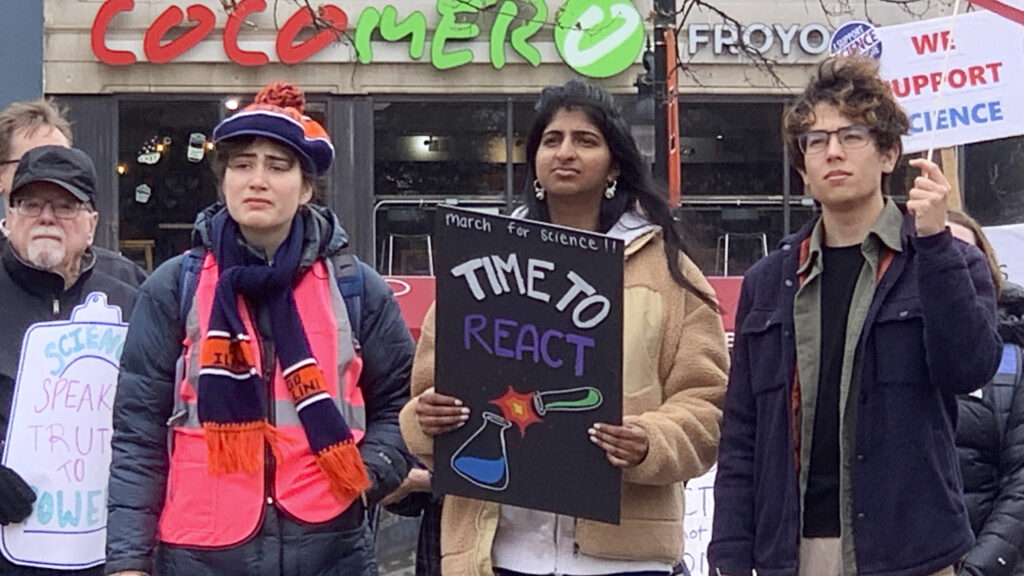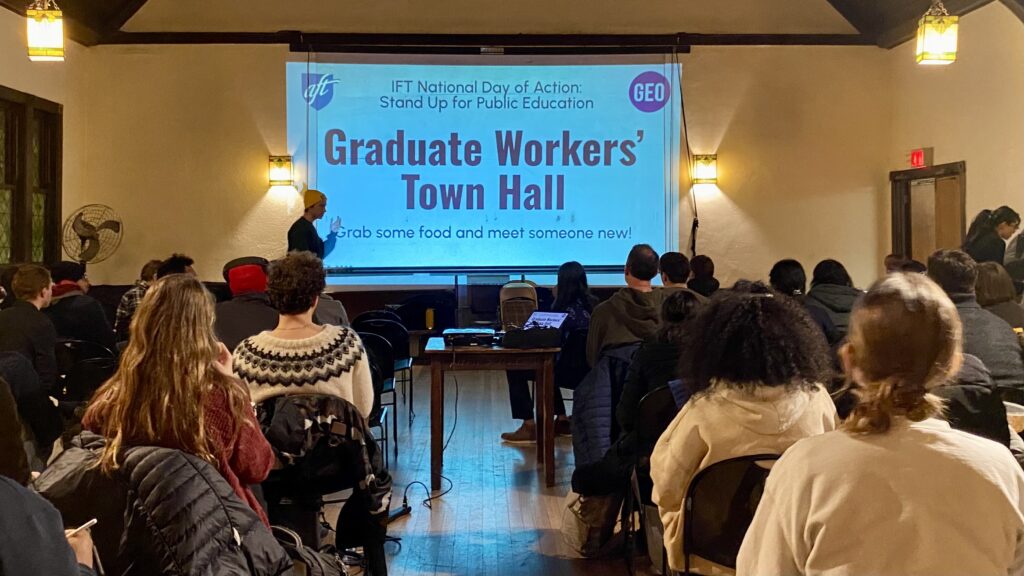URBANA — Hundreds of people gathered at the University of Illinois Urbana-Champaign Friday to rally against President Donald Trump’s attempts to freeze federal funding. They held picket signs and chanted, “Stand up, fight back,” and “Elon Musk has got to go.”
The Trump administration has attempted to pause federal spending, including grants for research, as part of a broader effort to dramatically restructure the federal workforce and slash government spending. This week, a second federal judge moved to block Trump’s spending freeze. But many Champaign-Urbana residents and members of the U of I community remain concerned.
The march on Friday was part of a nationwide movement, Stand Up for Science, which is calling for the protection — and expansion — of scientific funding and opportunities.
March co-organizer Dana Green, a postdoctoral researcher at U of I, spoke at the rally.
Science “is for the food on our tables and the clean water that comes out of our tap,” Green said. “Science is for everyone who wants their children and grandchildren to be able to see the wolves of Yellowstone running wild, and for everyone who knows that knowledge is power.”
Two days prior to the march, the U of I’s Graduate Employees’ Organization facilitated a town hall meeting at the Channing-Murray Foundation. The event was sponsored by the American Federation of Teachers and tied to the group’s National Day of Action — a nationwide initiative for educators, students, teachers and community allies to stand up in defense of public education.
Organizers said the goal was to get graduate workers on the same page. Dozens of graduate students from a variety of fields — from history to mechanical engineering – discussed their concerns following recent federal orders. Many of them feel that their departments have not communicated much information to them about the recent federal orders and their impacts.
Arthur Paganini, a GEO officer and a third-year Ph.D. student in mechanical science and engineering, led the town hall. Although courts have frozen many of Trump’s executive orders, Paganini told attendees there are no guarantees the court orders will work or that Trump won’t try again.
“We make the university run,” he said. “When we recognize that we have power in that, that’s when we can flex our muscles.”
Federal orders have already led to layoffs
Scott Oswald, a speaker at the rally, said he was terminated from his position as a U.S. Department of Agriculture postdoctoral researcher as part of a federal employee purge. He said cuts have led to dozens of layoffs.
Across the U.S., more than 62,000 federal workers lost their jobs in February, according to a report by Challenger, Gray & Christmas.

Wendy Dorman, an ornithology graduate worker, said she received a NASA FINESST Grant over the summer to conserve and support grassland birds in Illinois. Despite already being approved, she said the Trump administration’s Department of Government Efficiency, or DOGE, decided to re-review her grant.
Dorman said researchers already undergo a rigorous process of proving the worth of their research to specialists and experts for their proposals to be approved.
“I don’t necessarily think that it’s being reviewed for its merit because it already went through a peer review process looking at its merit,” she said.
The Soybean Innovation Lab has also been forced to close, leading to 30 layoffs, as a direct result of Trump’s Jan. 26 funding freeze. The lab aids researchers and organizations with funds and technology to advance soybean development in Africa.
According to Peter Goldsmith, director of Soybean Innovation Lab and speaker at the rally, the lab was successfully building a market for soybeans in Africa to reduce poverty. Because of the lab’s positive economic impact, he said he expected the lab would continue under the new administration. Instead, all 19 labs received the same termination notice.
“We were not in the nation’s interest,” Goldsmith said. “This is an opportunity lost and a real shame, and we got caught up in a bad storm.”
Concerns for the future
Oswald said he had struggled for a year to get a job before becoming a federal employee. He explained that with thousands of federal workers being unemployed, the job market has just gotten tougher. In addition, universities and state labs might not have the resources to hire new workers, according to Oswald.
“If a lot fewer people were working on these research problems, then it’s like you’re just less likely to have those innovations or solutions to problems that we have in agriculture or health,” Oswald said.
Researchers who have five-year grants run the risk of having their funds cut mid-research, wasting money and investment from those who planned long-term projects.
“We’re wasting a lot of money by cutting these things off kind of mid-stride,” Dorman said. “We don’t get a product. You just can’t recoup all the losses that they’re causing right now.”
International students also raised concerns about visas. If they lose the federal funding that supports their graduate research, they would have to return home. Aline Leite Vilela D’Oliveira, a U of I math graduate student and an international student, said that’s her biggest concern.
“Depending on how active you are in certain things politically, that’s not felt well for the current administration. And being an international student and having anything that can jeopardize your visa—that makes me afraid,” she said. “I’m fine going back to my country. I’m not fine going back to my country without a Ph.D. with me.”
The U of I is considered to be an R1 school, meaning it has among the highest levels of research activity. Patrick C. Wade, U of I director of executive communications and issues management, said federal funding accounted for $615 million of the university’s total sponsored research budget of nearly $755 million in FY 2024.
“Any recalculation of indirect cost rates or changes to how research is funded would have a significant impact in our ability to conduct research, not just at Illinois but across the nation,” Wade said in an email.
The Trump administration has proposed cutting indirect funds to universities from agencies like the National Institutes of Health — a move that has been temporarily halted by a federal judge. If those indirect cuts take effect, universities will have to pay gaps in their budget for building maintenance, staff, classrooms, equipment and supplies — all of which facilitates and assists with research.
The consequences of funding freezes go beyond current research — they will also impact future generations, Dorman said.
“We are telling students to go into STEM and you can have a career,” she said. “What kind of career are we expecting them to have right now when we’re cutting off those jobs? What do we hope that they would aspire to instead? What kind of America are we trying to build?”

Plans for the future
A recent email from U of I Chancellor Robert Jones said the university is still searching for answers regarding recent federal orders. In regards to the NIH Facilities and Administrative costs cap, Jones said: “Capping this negotiated rate for overhead research would significantly impact the university’s cost-share to maintain our research portfolio.”
The GEO town hall on Wednesday concluded with a brainstorming session to come up with a plan of action. Many attendees said they feel U of I officials are not being transparent about their plans regarding these federal changes. Some grad workers emphasized the importance of organizing without their departments and being willing to rally to make change.
Additional ideas for next steps included planning informational sessions on international students’ rights, requesting more information from departments, getting involved with local representatives and organizing as a union.
Kayla Morrison, a U of I graduate student in national resources and GEO officer, said building community is imperative in the next four years.
“I know that the strategy within the Trump administration is to try to isolate people and try to break down communities and make people feel hopeless,” Morrison said. “This is a really great meeting trying to build community and build camaraderie and let people know that they’re not alone.”
Paganini echoed Morrison’s sentiment. He said waiting for someone else to fix things is not something grad students can afford to do.
“Just because we’re worried or just because we’re scared, doesn’t mean we don’t do anything,” Paganini said. “It means the opposite. It means we have to fight harder.”

